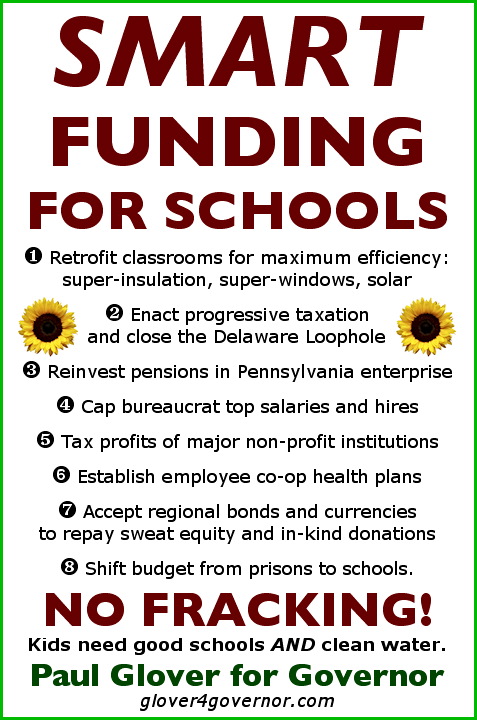 1. Philadelphia schools are struggling to make up for a $304 million dollar budget gap this year, and the prognosis for next year does not look good (The Notebook). What do you think the best solution(s) are for the School District of Philadelphia’s financial problems?
1. Philadelphia schools are struggling to make up for a $304 million dollar budget gap this year, and the prognosis for next year does not look good (The Notebook). What do you think the best solution(s) are for the School District of Philadelphia’s financial problems?Smart funding of our schools, without resort to fracking, will include the following:
A. Cut expense for heating and cooling in half by retrofitting schools for maximum efficiency:super-insulation, super-windows, solar power and solariums. This releases more money for teachers, students and pleasant classrooms. Energy efficiency is my top budget priority.
B. Enact progressive taxation and close the Delaware Loophole. Pennsylvania is a desirable place to live and do business. We need corporate partners, not corporate siphons.
C. Reinvest part of pensions in Pennsylvania enterprise, to expand the tax base. I've created plans for regional stock exchanges, such as the Philadelphia Regional & Independent Stock Exchange (PRAISE) http://www.greenjobsphilly.org/static_praise.php
D. Cap school district bureaucrat top salaries. It is outrageous when top-level desk jockeys become more dedicated to gigantic paychecks than to children. Reducing their salaries means that only those with real passion will remain.
E. Tax profits of major non-profit institutions. A shopping mall owned by a hospital, for example, should contribute to public education.
F. Establish employee co-op health plans. We will dramatically reduce costs of health insurance, for both teachers and taxpayers, by creating a genuinely nonprofit insurance system. I am founder of the Ithaca Health Alliance, a local co-op which covered members for 12 categories of common emergency for $100/year http://www.ithacahealth.org And I'm author of "Health Democracy," describing this system: http://www.paulglover.org/hdbook.html
G. Accept regional bonds and currencies to repay sweat equity and in-kind donations. This expands the money supply and reduces dependence on dollars. I am founder of one such plan, which has transacted millions of dollars equivalent value and made interest-free loans for community benefit. http://www.paulglover.org/hourintro.html
H. Issue bonds through a Pennsylvania state bank, starting with 10% of unrestricted state funds. State incentives should be available to universities and school districts that 1) restrain administrative salaries; 2) restrain new construction; 3) superinsulate and cogenerate; 4) invest endowments and pensions in a new Pennsylvania state bank.
I. Shift budget from prisons to schools. Tracking children into prison is itself the greatest crime. My budget will reverse this. At the same time, I will establish the Green Labor Administration (GLAD) to create 500,000 green collar jobs statewide and encourage curricula which prepare the young to take these responsibilities. I'm author of the book "Green Jobs Philly" http://www.issuu.com/metroeco/docs/greenjobsphilly former publisher of Green Jobs Philly News http://www.greenjobsphilly.org/news and taught Green Jobs at Temple University.
J. The state budget should Leave No School Behind. All schools should have modern libraries with computers. Head Start should be expanded to enable all children to enjoy pre-K activities.
K. Raise State proportion of funding toward 50%. This will be especially practicable as the reforms above proceed. No homeowner should lose their home because of school tax burden, so I support tripwires that require the State to take up slack.
 2. You identified yourself as “strongly in favor” of replacing the School Reform Commission with a locally elected school board. If elected Governor, what concrete steps would you take to making this belief a reality?
2. You identified yourself as “strongly in favor” of replacing the School Reform Commission with a locally elected school board. If elected Governor, what concrete steps would you take to making this belief a reality?Act 46 should be repealed. Since I am addressing the SRC question first in this second round of questions, I'd emphasize that I'm fed up with bureaucratic bloat and insider dealing, whether state or local. Kids are too important, so I'd encourage teachers and parents to define and enact strong controls on locally-elected board priorities, accountability and transparency.
3. Groups like the Commonwealth Foundation are seeking to undo union rights in Pennsylvania, specifically by taking away their ability to collect dues directly from member paychecks. If elected, how would you respond to this kind of legislation? What concrete steps would you take to protect unions in Pennsylvania?
Teachers and all workers have an absolute right to organize unimpeded and, where unions are established, the right to dues collection should not be blocked. Unions will become stronger to the extent they connect with one another to promote the entire working class--union and non-union-- rather than merely specific trades. I favor worker ownership. Employment disruption disturbs community stability, thus damages education.
4. The new state-wide system for teacher evaluation (PVAAS) bases at least 30% of a teacher’s total rating on standardized test scores (Research for Action, Post-Gazette). What effect do you think this new system will have on teaching and learning in public schools?
Teaching should be always a mission-- the main lesson a teacher can teach is love of learning. Schools should make it easy for teachers to retain their enthusiasm, by encouraging student and teacher creativity. Reading, writing and math are not enough. Rigid rote standards leave every child behind.
Therefore curriculum reform is needed, to prepare youngsters for community management and green enterprise. Arts must be part of the core curriculum, to stimulate creative thinking. Arts provide constructive outlets for both enthusiasm and frustration.
5. This new evaluation system does not apply to teachers in charter or independent schools. Do you support this exemption? If not, what would you do to change it?
Charter school evaluations should be held to standards at least as high as public schools, especially since charters assert that privatization gets better results.
6. Pennsylvania currently allows a “religious exemption” for state standardized testing, which many families use as a back door to opting out (Newsworks). Do you support the rights of all families to opt their children out of state standardized exams?
Some school districts and some homeschoolers might indeed teach their children that the world is flat and began 6,000 years ago. But even so, I encourage the replacement of state standardized exams by learning exeriences that reward the pace and style of each student.
Again, the best education prepares students to enjoy learning and discover their enthusiasms, to better serve community and nature.
7. Is there anything else you would like to tell the public about your views on education?
Society benefits when youth of all backgrounds become capable leaders. Therefore the Green Party promotes free college education. Student debt, especially without recourse to bankruptcy, is corporate servitude. It is the obligation of elder generations to transfer knowledge painlessly, so that society can advance.
A state budget which subordinates student ambitions to corporate priorities fails the next generation and the nation. Well-rounded education, especially in a democracy, teaches youngsters not only to conform and fit in, but teaches them to make decisions together. Patriotic education even teaches them how to rebel and win. I published “Treetop: a small journal of liberation and education” in the 1970s.
Neighborhoods should prepare young people to welcome education. Therefore I’ve drafted plans for an afterschool program called Neighborhood Enterprise SchoolTeachers (NESTS) http://www.paulglover.org/nests.pdf NESTS would reward and credential neighbors, particularly in low-income neighborhoods, for sharing their skills with the young. This revives respect for learning, by providing immediate material benefit and respect.
Schools should be living examples of the healthier society we hope to build. For example, schools can be rebuilt to rely on solar greenhouses and energy efficiency. Schoolyards should be depaved and planted, to reconnect urban kids to nature. I'm the founder of the Philadelphia Orchard Project (POP), which has planted 35 orchards within Philadelphia so far. Young volunteers have been the mainstay. http://www.phillyorchards.org